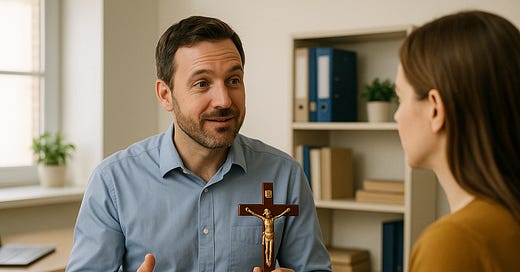What Do Catholics Believe?
Explaining Our Faith When Someone Asks, 'Aren’t You Just a Christian?
This morning, something simple but profound happened at work. A coworker stepped into my office, and as we chatted, I casually mentioned that I was Catholic. She looked at me, a little surprised, and said, “Oh! I thought you were Christian.” I smiled and said, “I am Christian—I’m a Catholic Christian.”
That sparked a laugh between us, but also an important conversation. Her confusion wasn’t unique. What she was really asking was: What’s the difference between Catholics and other Christians? And that got me thinking—do most of us even know how to clearly answer that question?
If you’ve ever found yourself unsure of how to explain your faith when someone asks what Catholics believe, this article is for you. I want to give you a basic, loving, and respectful way to share the foundation of our Catholic faith—without coming across as prideful or as if we’re trying to say “we’re better.” It’s not about winning arguments. It’s about witnessing to the truth with humility.
So—What Is a Catholic?
A Catholic is a Christian. Plain and simple. We believe in Jesus Christ, the Son of God, who died for our sins and rose again. That’s the core of Christianity, and Catholics are 100% in on that. But Catholics are also part of the Church that has roots going back over 2,000 years, to the time of the Apostles—especially Peter, whom we believe was the first Pope.
The word Catholic means “universal.” We are part of the universal Christian Church, founded by Christ, passed down through the apostles, and guided through history by sacred tradition and the teaching authority of the Church (called the Magisterium).
The Basics of Catholic Belief
Here’s a simple, conversational summary of what Catholics believe:
God is Father, Son, and Holy Spirit – We believe in the Holy Trinity.
Jesus is our Lord and Savior – Born of the Virgin Mary, He lived, died on the cross for our sins, rose from the dead, and will come again.
The Bible is God’s Word – It is sacred and true, and Catholics read it along with Sacred Tradition, the teachings passed down through the Church.
The Church is a family – Not just a building. The Catholic Church is a community of believers around the world, united by the same faith and sacraments.
The Eucharist is Jesus – At Mass, we believe the bread and wine truly become the Body and Blood of Christ.
The Sacraments are encounters with God – There are seven of them, and each is a way God pours grace into our lives (like Baptism, Confession, and the Eucharist).
Mary and the Saints are our prayer partners – We don’t worship them; we ask them to pray with us and for us—just like asking a friend to pray for you.
We believe in Heaven, Hell, and Purgatory – And we strive to live holy lives so we can one day be with God forever.
It’s Not Us vs. Them
When people ask, “What’s the difference between Catholics and Protestants?” we need to answer kindly and clearly. We share a lot in common—we both believe in Jesus Christ, the Bible, salvation by grace, and the importance of living a faithful life. The differences come in areas like the role of the Pope, the number of sacraments, how we interpret Scripture, and the authority of the Church.
But here’s the key: the goal isn’t to argue. The goal is to explain with love. We’re all trying to follow Jesus. Catholics just believe He gave us a Church to help us do that—one, holy, catholic, and apostolic.
Why It Matters to Know This
If someone asked you, “What do you believe?” would you be able to answer? Not with fancy theological terms, but with clarity and heart?
We should all be ready to share our faith—not to debate, but to invite. And if your answer simply starts with, “I believe Jesus is my Lord and Savior, and I follow Him in the Catholic Church,” that’s already a powerful witness.
So next time someone says, “Wait… I thought you were just a Christian,” smile and say, “I am. I’m a Catholic Christian. Want to hear what that means?”
Because now, you’re ready.
Call to Action:
Take a few minutes today and write out your own short version of “what I believe as a Catholic.” Keep it simple, kind, and true to your heart. You never know when someone will walk into your office—or your life—and ask.




